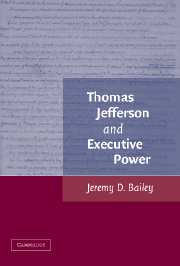Book contents
- Frontmatter
- Contents
- List of Figures and Table
- Preface
- Acknowledgments
- Abbreviations
- 1 “The execution of laws is more important than the making of them”: Reconciling Executive Power with Democracy
- 2 Executive Power and the Virginia Executive
- 3 Executive Power and the Constitution of 1787
- 4 “To place before mankind the common sense of the subject”: Declarations of Principle
- 5 The Real Revolution of 1800: Jefferson's Transformation of the Inaugural Address
- 6 To “produce a union of the powers of the whole”: Jefferson's Transformation of the Appointment and Removal Powers
- 7 The Louisiana Purchase
- 8 To “complete their entire union of opinion”: The Twelfth Amendment as Amendment to End All Amendments
- 9 “To bring their wills to a point of union and effect”: Declarations and Presidential Speech
- Development and Difficulties
- Index
1 - “The execution of laws is more important than the making of them”: Reconciling Executive Power with Democracy
Published online by Cambridge University Press: 24 July 2009
- Frontmatter
- Contents
- List of Figures and Table
- Preface
- Acknowledgments
- Abbreviations
- 1 “The execution of laws is more important than the making of them”: Reconciling Executive Power with Democracy
- 2 Executive Power and the Virginia Executive
- 3 Executive Power and the Constitution of 1787
- 4 “To place before mankind the common sense of the subject”: Declarations of Principle
- 5 The Real Revolution of 1800: Jefferson's Transformation of the Inaugural Address
- 6 To “produce a union of the powers of the whole”: Jefferson's Transformation of the Appointment and Removal Powers
- 7 The Louisiana Purchase
- 8 To “complete their entire union of opinion”: The Twelfth Amendment as Amendment to End All Amendments
- 9 “To bring their wills to a point of union and effect”: Declarations and Presidential Speech
- Development and Difficulties
- Index
Summary
Your Administration, will be quoted by Philosophers, as a model, of profound Wisdom; by Politicians, as weak, superficial, and short-sighted.
John Adams to Thomas Jefferson, 3 July 1813Mr. Jefferson appears to me to be a man who will embody himself with the house of representatives. By weakoning the office of President he will increase his personal power.
John Marshall to Alexander Hamilton, 1 January 1801But it is not true as is alleged that he [Jefferson] is an enemy to the power of the Executive, or that he is for confounding all the powers in the House of Rs. It is a fact which I have frequently mentioned that while we were in the administration together he was generally for a large construction of the Executive authority, & not backward to act upon it in cases which coincided with his views.
Alexander Hamilton to James Bayard, 16 January 1801Historians and philosophers have written countless studies of Jefferson's life and ideas, but few have examined Jefferson's understanding of executive power. So, too, with political scientists: in the issue of Presidential Studies Quarterly marking the bicentennial of the United States Constitution, scholars reexamined the presidency as understood by George Washington, James Madison, John Adams, Alexander Hamilton, James Wilson, and Gouverneur Morris — but not Jefferson. There is a reason for this omission. Jefferson has been remembered by admirers and critics alike as preferring a weak executive, and partisans of feebleness do not make good subjects for studies of the presidency.
- Type
- Chapter
- Information
- Thomas Jefferson and Executive Power , pp. 1 - 27Publisher: Cambridge University PressPrint publication year: 2007



